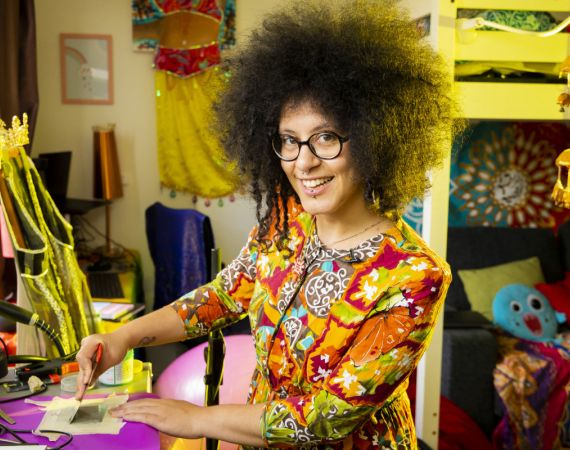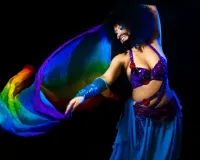Shrouk El-Attar
Shrouk El-Attar is an engineer, belly dancer, refugee and LGBT+ rights campaigner from Egypt.

Shrouk El-Attar by Diego Maeso
Projects

Dancing Queer
Winter Residency 2021-22 artist Shrouk El-Attar brings together engineering and drag performance to create a belly-dancing robot.Shrouk El-Attar is an engineer, belly dancer and refugee who has been listed BBC 100 most influential women in the world in 2018, United Nations refugee agency Young Woman of the year 2018, and IET Top 6 young women engineers in the UK in 2019 and in 2020.
Shrouk arrived to the UK as a child refugee in 2007 where she attended school and was two years ahead of her peers, but was later unable to access university to study engineering due to being an asylum seeker. Shrouk then joined Student Action for Refugees (STAR) and led the campaign for Equal Access to Higher Education for Asylum Seekers, now successful at more than 70 universities across the UK.
One of Shrouk El-Attar’s earliest memories was realising that people on TV were not tiny people living inside it. To her, electronics was magic! She dreamt of the day she’d become this magician. Now, she is recognised as one of the top 6 Young Women Engineers in the UK by the Institution of Engineering and Technology (IET).
Growing up queer to a conservative muslim family in Mubarak’s Egypt is not easy. And when finally thought to have reached safety in the UK, the term “Safety” could not have been further from the truth. Shrouk’s involvement in the Egyptian LGBT+ scene is undoubtedly dangerous, yet their experience of how the UK treats queer refugees poses new unexpected challenges.
Through public speaking, Shrouk shares their story about being a queer refugee from Egypt, a country where it is often considered the state’s, the community’s, and the family’s duty to punish LGBT+ individuals for who they are and who they love. They work to reveal information about some of the inhumane treatment queer asylum seekers are often met with through the UK home office “hostile environment” policies.
Shrouk is also an artist and belly dances in drag as a method of protesting her country’s treatment of LGBT+ people, where they are imprisoned and sectioned to mental health asylums. She has performed all over the UK, Europe, and in countries as far as Japan and India. Her performance raises funds for LGBT+ campaigners in Egypt and has been featured on many well-known media outlets like HuffPost, BBC, Reuters, Pink News, and Buzzfeed.